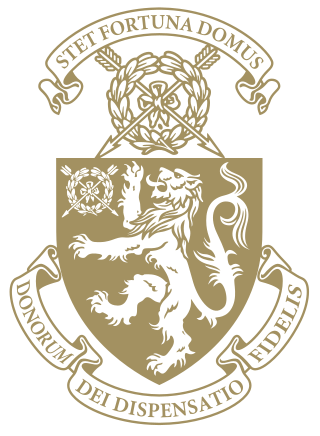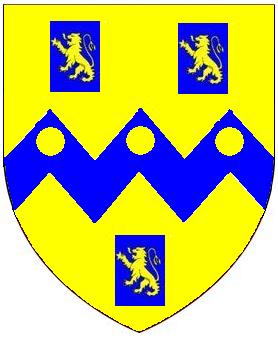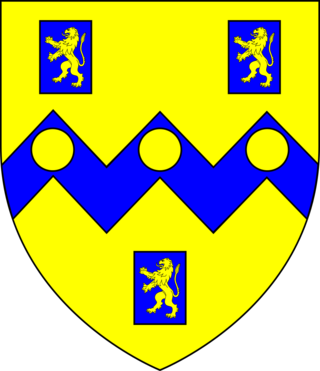Related Research Articles

1818 (MDCCCXVIII) was a common year starting on Thursday of the Gregorian calendar and a common year starting on Tuesday of the Julian calendar, the 1818th year of the Common Era (CE) and Anno Domini (AD) designations, the 818th year of the 2nd millennium, the 18th year of the 19th century, and the 9th year of the 1810s decade. As of the start of 1818, the Gregorian calendar was 12 days ahead of the Julian calendar, which remained in localized use until 1923.

Harrow School is a public school in Harrow on the Hill, Greater London, England. The school was founded in 1572 by John Lyon, a local landowner and farmer, under a royal charter of Queen Elizabeth I.

Lucius was a supposed 2nd-century king of the Britons traditionally credited with introducing Christianity into Britain. Lucius is first mentioned in a 6th-century version of the Liber Pontificalis, which says that he sent a letter to Pope Eleutherius asking to be made a Christian. The story became widespread after it was repeated in the 8th century by Bede, who added the detail that after Eleutherius granted Lucius' request, the Britons followed their king in conversion and maintained the Christian faith until the Diocletianic Persecution of 303. Later writers expanded the story, giving accounts of missionary activity under Lucius and attributing to him the foundation of certain churches.

St James's Church, Piccadilly, also known as St James's Church, Westminster, and St James-in-the-Fields, is an Anglican church on Piccadilly in the centre of London, England. The church was designed and built by Sir Christopher Wren.
Boconnoc is a civil parish in Cornwall, England, United Kingdom, approximately four miles (6 km) east of the town of Lostwithiel. According to the 2011 census the parish had a population of 96.
Harley is a surname, and may refer to
Events from the year 1821 in the United Kingdom. This is a census year.
Callington was a rotten borough in Cornwall which returned two Members of Parliament to the House of Commons in the English and later British Parliament from 1585 to 1832, when it was abolished by the Reform Act 1832.
Events from the year 1724 in Ireland

The Smith, later Bromley, later Pauncefote-Bromley, later Bromley-Wilson, later Bromley Baronetcy, of East Stoke in the County of Nottingham, is a title in the Baronetage of Great Britain. It was created on 31 October 1757 for the banker George Smith, High Sheriff of Nottinghamshire from 1757 to 1759. He was the eldest son of Abel Smith I (1686–1756) of Nottingham, the 2nd son of Thomas Smith I (1631–1699), the founder of Smith's Bank in Nottingham. His younger brothers included: Abel Smith II (1717–1788) and John Smith, ancestor of Julian Pauncefote, 1st Baron Pauncefote.

Sir James Bailey JP, DL, MP, was a British Conservative Party politician who served from 1895 to 1906 as Member of Parliament (MP) for Walworth in South London. He was also a successful hotel developer, most notably for establishing the Bailey's Hotel in Kensington, and the founder of a London gentlemen's club, the Constitutional Club. Baileys Irish Cream is named for the hotel that bears his name.

Sir Samuel Rolle of Heanton Satchville in the parish of Petrockstowe, Devon, served as Member of Parliament for Callington, Cornwall in 1640 and for Devon 1641–1647. He supported the parliamentary side in the Civil War.
Sir John Pakington, was Chirographer of the Court of Common Pleas, a Member of Parliament for Gloucester, and Sheriff of Herefordshire and Worcestershire. In 1529 he received an extraordinary grant from Henry VIII permitting him to wear his hat in the King's presence.

Weare Giffard is a small village, civil parish and former manor in the Torridge district, in north Devon, England. The church and manor house are situated 2 1/2 miles NW of Great Torrington in Devon. Most of the houses within the parish are situated some 1/2-mile east of the church. The church is situated on a hillside to the north and slightly above the wide and flat valley floor of the River Torridge. The Church of the Holy Trinity and the adjacent Weare Giffard Hall are designated members of the Grade I listed buildings in Devon. In 2011 the parish had a population of 345.

Stevenstone is a former manor within the parish of St Giles in the Wood, near Great Torrington, North Devon. It was the chief seat of the Rolle family, one of the most influential and wealthy of Devon families, from c. 1524 until 1907. The Rolle estates as disclosed by the Return of Owners of Land, 1873 comprised 55,592 acres producing an annual gross income of £47,170, and formed the largest estate in Devon, followed by the Duke of Bedford's estate centred on Tavistock comprising 22,607 with an annual gross value of nearly £46,000.

John Rolle (1522–1570) of Stevenstone, in the parish of St Giles in the Wood, near Great Torrington, Devon, was the eldest son and heir of George Rolle, MP, founder of the great Rolle family of Stevenstone, by his second wife Eleanor Dacres. Three monuments survive in memory of his immediate family in the churches of St Giles in the Wood and Chittlehampton.
Events from the year 1809 in Scotland.
Craven Ord (1756–1832) was an English antiquarian. He was particularly noted for his brass rubbings.

Fanny Mackay, better known as Fanny Dango, was a British comedienne, singer and actress who found fame in both the UK and Australia. She was one of the Rudge Sisters. She married a rich Australian grazier and died in Australia.
References
- ↑ "George Robert Broad". Victorian Web. Retrieved 5 October 2015.
- ↑ "George Robert Broad". Mapping the Practice and Profession of Sculpture in Britain and Ireland 1851-1951, University of Glasgow History of Art and HATII, online database 2011. Retrieved 5 October 2015.